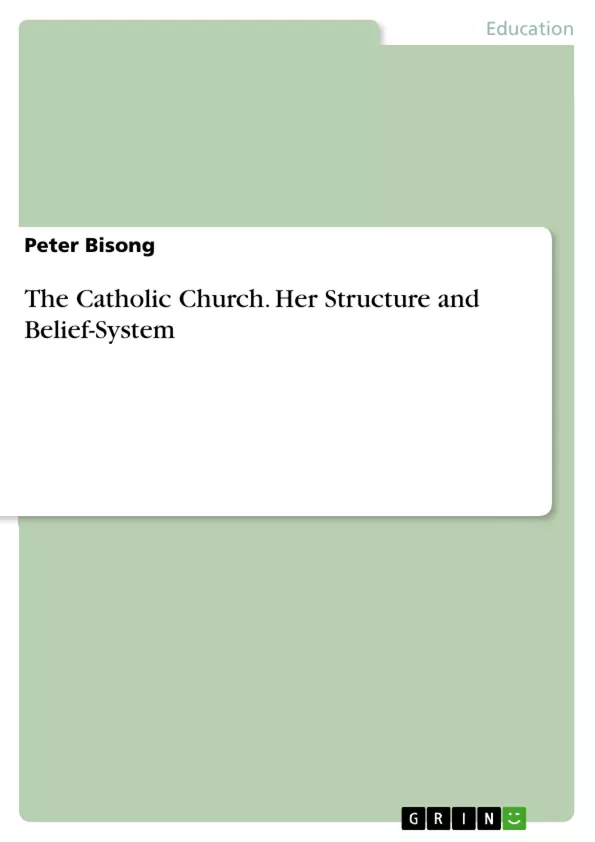This book tries to give an overview over the pillars of catholic faith and tries to introduce and explain those foundations of faith from several points of view.
This book is not a specialized theological work. Rather, it is a lucid explanation of the catholic faith capable of reviving spiritually dead and dying Catholics to full realization of the richness of the heritage they are entrusted with. It starts with a explanation of the Roman Catholic Church itself, before moving on to the topic of virgin Mary, the sacred images of the Roman Catholic Church and its saints.
Subsequently, the holy rosary and the doctrin eof purgatory, as well as the eucharist are explained, before trying to answer some of the most pressing questions in connenction with the Catholic Church. Finally, the book closes by discussing the way of the mass and the holy spirit.
Table of Contents
- FOREWORD
- PREFACE
- CHAPTER ONE: THE HOLY ROMAN CATHOLIC CHURCH
- THE BEAUTY OF THE CATHOLIC CHURCH
- SOURCES OF CATHOLIC TEACHINGS
- THE CHURCH - AN OBJECT OF ADMIRATION AND CRITICISM
- CHAPTER TWO: THE BLESSED VIRGIN MARY
- CHAPTER THREE: THE SACRED IMAGES AND THE CATHOLIC CHURCH
- CHAPTER FOUR: CATHOLICS AND PRAYERS TO THE SAINTS
- CHAPTER FIVE: THE HOLY ROSARY
- CHAPTER SIX: THE DOCTRINE OF PURGATORY
- CHAPTER SEVEN: THE BLESSED EUCHARIST
- CHAPTER EIGHT: QUESTIONS FOR THE CHURCH
- QUESTIONS REGARDING THE CHURCH
- QUESTIONS REGARDING THE SACRAMENTS
- QUESTIONS REGARDING LITURGY
- QUESTIONS ON CATHOLIC MODE OF PRAYERS
- CHAPTER NINE: THE WAY OF THE MASS
- THE INTRODUCTORY RITE
- THE LITURGY OF THE WORD
- THE LITURGY OF THE EUGHARIST
- THE CONCLUDING RITE
- CHAPTER TEN: THE HOLY SPIRIT
Objectives and Key Themes
This book aims to provide an in-depth explanation of the Catholic Church's structure and belief system. It seeks to clarify common questions and misconceptions about Catholic practices and doctrines.
- The nature and beauty of the Catholic Church
- The role of the Blessed Virgin Mary in the Catholic Church
- The significance of sacred images and the practice of praying to saints
- The doctrines of purgatory and the Eucharist
- The importance of the Holy Spirit in the life of Christians
Chapter Summaries
- Chapter One: The Holy Roman Catholic Church: This chapter introduces the Catholic Church as a universal and welcoming institution that seeks to nurture souls for heaven. It explores the sources of Catholic teachings and addresses the admiration and criticism the Church faces.
- Chapter Two: The Blessed Virgin Mary: This chapter explores the veneration of Mary as the Mother of the Christian Church and discusses why she deserves honor and devotion.
- Chapter Three: The Sacred Images and the Catholic Church: This chapter explains the Catholic Church's use of images and the rationale behind bowing to them and praying before statues.
- Chapter Four: Catholics and Prayers to the Saints: This chapter addresses the question of whether saints are in heaven and their role in intercession. It also explores how Catholics recognize and learn about saints, including through miracles.
- Chapter Five: The Holy Rosary: This chapter describes the practice of praying the rosary, highlighting its beauty and power.
- Chapter Six: The Doctrine of Purgatory: This chapter explains the concept of purgatory and its significance for Catholics, contrasting it with Protestant views. It also includes revelations on the subject.
- Chapter Seven: The Blessed Eucharist: This chapter focuses on the Eucharist, exploring its significance as a sign of the New Covenant and a memorial of Christ's sacrifice. It also discusses miracles associated with the Eucharist.
- Chapter Eight: Questions for the Church: This chapter addresses common questions about the Catholic Church, sacraments, liturgy, and prayer practices.
- Chapter Nine: The Way of the Mass: This chapter provides a detailed explanation of the structure and components of the Catholic Mass, from the introductory rite to the concluding rite.
- Chapter Ten: The Holy Spirit: This chapter explores the nature and role of the Holy Spirit in the lives of Christians, highlighting the benefits of the Holy Spirit's presence.
Keywords
This book explores key themes related to Catholic doctrines and practices. Important terms and concepts include the Catholic Church's structure and belief system, the Blessed Virgin Mary, sacred images, praying to saints, the Holy Rosary, the doctrine of purgatory, the Eucharist, the Holy Spirit, and the Catholic Mass.
- Citation du texte
- Dr Peter Bisong (Auteur), 2019, The Catholic Church. Her Structure and Belief-System, Munich, GRIN Verlag, https://www.grin.com/document/508577



